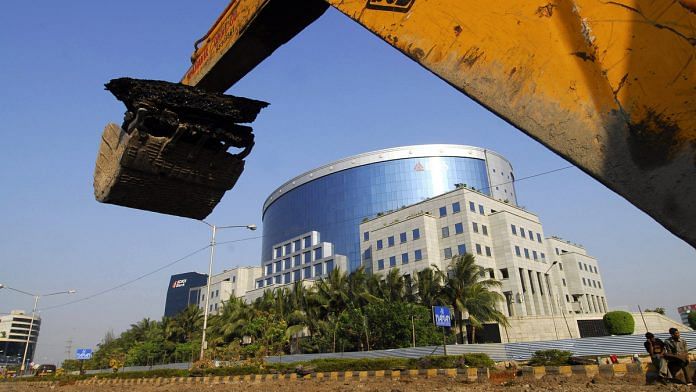New Delhi: Uncertainty has gripped the savings of several thousand workers as their pension trusts are suspected to be staring at losses after investing in the cash-strapped Infrastructure Leasing & Financial Services (IL&FS).
But that is not all: About 200 of the 1,400 such trusts in the country have not even filed their annual returns, which means there is absolutely no information on their investments or returns.
Reports suggest many pension funds were actively investing in the AAA-rated IL&FS and its group companies to earn better and “safe” returns.
“Bonds issued by IL&FS have been considered very safe because of its rating, so pension trusts have been investing. There has been no breach… Now there is a process to assess the exact quantum of losses and we will soon arrive at that, but at this point, it is difficult to say anything,” a senior finance ministry official told ThePrint on the condition of anonymity.
However, with some 200 trusts not filing their annual reports, it will be difficult to estimate the exact nature of the losses, an official from the Employees’ Provident Fund Organisation (EPFO) said.
State of exempt trusts
An amount of about Rs 3 lakh crore is managed by independent or “exempt trusts” run by companies. While there are about 1,400 exempt trusts, only about 1,200 have filed their investment and claims reports. As the rest did not submit their reports, there is no information on their investment, claims and returns, according to the EPFO.
The picture was not very different in November 2017. The EPFO website showed only 1,170 out of a total of 1,530 exempt trusts filing their investment and claims reports.
These exempt trusts are rated by the EPFO on the basis of six key performance parameters. The parameters include investment, claim settlement, timely transfer of PF accumulation into the trusts, interest declared, audit of accounts among others. For each of these segments, the trusts are given a maximum of 100 points, the total being 600.
In the EPFO’s latest performance analysis of these exempt trusts in November 2018, only 271 trusts scored a perfect 600.
Besides, the exempt trusts, the EPFO, through its central board of trustees (CBT), manages a corpus of over Rs 10 lakh crore.
Also read: There was major failure by rating agencies in IL&FS crisis, Parliamentary panel says
Little regulation
No action has been taken against the trusts that have not submitted their reports. Although on paper these trusts fall under the EPFO and its CBT, and are mandated to follow the same guidelines as that of EPFO under the Employees Provident Fund Act,1952, there is no accountability and no concrete guidelines governing them.
“The exempt trusts are not under us and we do not monitor them… If something goes wrong, we cannot be held responsible,” said a senior official of EPFO.
These trusts have to submit their reports annually to the EPFO and its CBT, but sources said that the screening of their investments and returns is not adequate.
The EPFO officially examines the exempt trusts only annually, but that also happens more as a ritual.
“If you have joined a company with an exempt trust, that is your choice and we cannot do much about it,” one of the officials said.
As per law, companies are allowed to set up their own private trusts after they get government approval.
Parliamentary panel’s recommendation
Last year, a parliamentary panel under BJP MP Kirit Somaiya underlined the need to clearly chalk out stringent guidelines for these exempt trusts.
“The ministry must put in place a deterrent mechanism well in time to keep tab on such errant establishments along with appropriate use of the provision for imposing stringent penalty on them, which would act as a deterrent for the future. The committee would also like to be apprised of the progress achieved herein,” the panel said.
The panel had also underlined the need to collect data on the total number of PF trusts, their subscriber base and contribution. Besides, it sought an estimate on the quantum of unclaimed money that these trusts hold.
Investment pattern
In 2015, the finance ministry, which charts out the investment pattern of the EPFO along with the exempt trusts, had barred these private PF entities from investing in any financial instrument of their own arm or subsidiary.
However, an EPFO order observed: “In the various reviews of EPF-exempted establishments (private PF trusts), it has been found that many establishments invest accumulated PF fund amount in their own entity or in their subsidiary entities; therefore some check points are recommended to stop such practices, as provided in the pattern of investment 2015.”
Also read: India seeks to reopen IL&FS books citing auditor mismanagement



